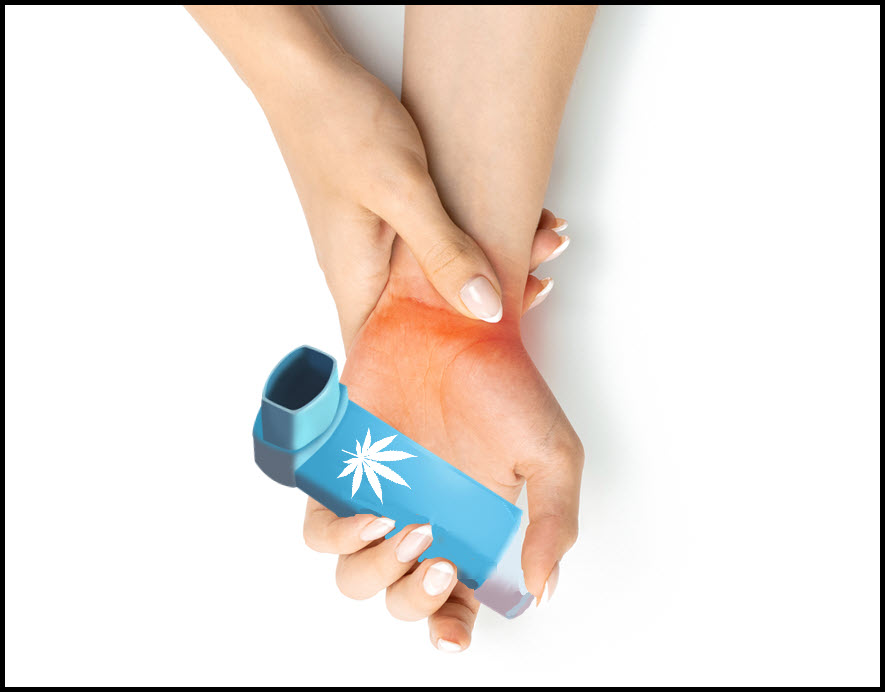
If you have neuropathy, try a cannabis inhaler for the best pain relief, says a new Israeli study
Israeli study shows aerosolized cannabis is beneficial for patients with neuropathy
Neuropathy, also known as nerve damage, can occur in various conditions such as diabetes, cancer and HIV. It refers to a group of conditions all associated with damaged peripheral nerves and the associated symptoms of this problem.
Symptoms of neuropathy can vary depending on the cause, but generally include permanent or temporary numbness, high sensitivity to touch, tingling or tingling sensations, paralysis, muscle weakness, impaired sexual function, and many others. Neuropathy can be treatable depending on its severity, although treatments focus on helping the nerves regenerate or recover. Depending on the case, the neuropathy may or may not be reversible, and treatment can be notoriously difficult and painful. Patients often struggle with chronic pain and uncomfortable tingling.
However, finding an effective treatment is crucial as this condition prevents people from leading normal lives.
How cannabis can help
There is increasing evidence that cannabis in various forms can successfully reduce the symptoms of neuropathy. The latest study was conducted by Israeli researchers in Haifa who wanted to investigate how aerosolized cannabis administered through a novel selective-dose inhaler works in patients with chronic pain and neuropathy. The patients took an average of 1.5 mg of delta-9-THC for several months.
The researchers found that this treatment was beneficial in reducing pain while improving quality of life. “Medical cannabis treatment with the Syqe inhaler demonstrated overall long-term pain relief, quality of life improvements, and opioid sparing effects in a cohort of chronic pain patients using only a fraction of the amount of MC [medical cannabis] compared to other routes of administration by inhalation. These results were associated with a lower rate of AE [adverse events] and almost no AE reports during long-term steady-state follow-up. Additional follow-up studies in a larger population are warranted to confirm our results,” the authors concluded.
Syqe Medical is an Israeli medical company responsible for the development of the world’s first pharmaceutical-grade selective plant medicine inhaler.
Another recent study, published in the journal Annals of Internal Medicine, examined the effectiveness of cannabis-related products for chronic pain. Researchers at Oregon Health and Science University used FDA-approved 100% THC synthetic cannabis products: dronabinol and nabilone. They also tested a product called Nabiximols, a sublingual spray with equal parts THC and CBD that has had some success treating neuropathic pain, although it’s not yet available in the United States.
In another 2018 study published in the American Journal of Neurology, researchers focused on radicular pain, a form of nerve pain that affects the spine and legs. They also analyzed the effects of THC on radicular pain in a cohort of 15 men suffering from chronic radicular nerve pain. Women were not included in the study because pain sensitivity in women fluctuates around the time of their menstrual period. All men reported moderate to severe pain for more than 6 months.
They initially received 15 mg of THC oil taken sublingually at the first visit, while 6 were administered with placebo oil. After a week, they returned for a second visit, then those given placebo received THC and vice versa. Researchers found that THC was effective at reducing pain compared to placebo. Pain scores were rated at an average of 53 before taking THC, which were reduced to an average of 35 after taking THC, while those in the placebo group rated them at 43.
“Pain is a complex experience that involves both the senses and emotions,” explains study author Haggai Sharon, MD, of Tel Aviv Medical Center’s Sagol Brain Institute. “Our study results link THC’s pain relief to a reduction in connections between areas of the brain that are otherwise highly interconnected, suggesting that THC may reduce pain by interfering with signals between these pain-processing pathways.”
“Interestingly, our results also show that the more connected the areas of the brain that process emotions and sensory perception prior to treatment, the greater the pain relief from THC ingestion,” explains Sharon. “Larger studies are needed to confirm our findings.”
Cannabidiol (CBD) may also be beneficial for neuropathy. A 2021 study conducted by Pure Green Pharmaceuticals Inc. analyzed the effects of water-soluble CBD sublingual tablets in diabetics with moderate to severe neuropathic pain. These 54 patients suffered from painful peripheral neuropathy in their feet and were randomly assigned to receive either the Pure Green 20mg CBD tablets or a placebo to take daily for 28 days.
They found that the patients given the CBD pills reported a significant reduction in pain levels compared to the pain group. In addition, those given CBD also reported an improvement in quality of life, as well as a reduction in anxiety and an improvement in sleep quality.
“To achieve clinical and statistical pain relief for these patients in just a few weeks is very gratifying and frankly unexpected. Interestingly, the results of this placebo-controlled study mirrored those of Pure Green Pharmaceuticals’ open-label pDPN study, in which both studies showed a significant reduction in pain scores of approximately 50 percent. Patient safety always comes first and has been our primary marker. In neither of the two clinical trials were there any side effects in patients taking medication,” said Dr. Debra Kimless, Pure Green’s Chief Medical Officer and Board-Certified Anesthesiologist.
“A joint drug development meeting with the FDA started us on this journey, and we look forward to returning to the FDA and sharing this data. The FDA is committed to alleviating the suffering of this very large patient population, especially as COVID-19 appears to have increased the number of diabetics,” added Stephen Goldner, CEO of Pure Green Pharmaceuticals and an FDA expert.
Conclusion
Given these promising results, patients with neuropathy are encouraged to speak to their physicians about the possibility of incorporating cannabis products into their treatment plans.
WHAT IS A CANNABIS INHALER, READ THIS…

WHAT IS A CANNABIS INHALER AND WHO MAKES THEM?

Post a comment: